
Introducing an artist with songwriting in her blood, who’s stepping back into the limelight after a spell behind the boards
 hat were you doing when you were 14? Hanging around outside McDonalds and smoking behind the bike sheds? Or maybe you were diligently doing your homework before heading off to choir practice? What you weren’t doing, we’re pretty certain, was singing backing vocals for Carole King on Nightingale.
hat were you doing when you were 14? Hanging around outside McDonalds and smoking behind the bike sheds? Or maybe you were diligently doing your homework before heading off to choir practice? What you weren’t doing, we’re pretty certain, was singing backing vocals for Carole King on Nightingale.
Then again, Carole King isn’t your Mum, is she? Because you’re not Louise Goffin, who just happens to be the first-born child of one of the most famous and successful songwriting partnerships of all time. It’s perhaps only natural, then, that she chose to pursue a career in music, making her stage debut at the tender age of 17, opening for Jackson Browne. A series of albums followed in the late 80s/early 90s, as well as work with Bryan Ferry and Tears For Fears; after that, Louise took a step out of the limelight, working behind the scenes both as a songwriter and in production for a few years. Most recently, she produced (and co-wrote some of) her mother’s Christmas album A Holiday Carole in 2011.
But now she’s stepping out once more as an artist in her own right. So let’s forget all about Louise Goffin, scion of musical royalty, and meet Louise Goffin… songwriter and performer.
Can you tell us exactly what you’re up to at the moment? Because we’ve heard some new songs – Indiglo, Everybody But You and Dance With The One – but there was no mention as to whether they’re getting released…
“No, right now those are just three tracks I’m putting out there, they’re not getting a full-scale commercial release. Really it’s just about me getting back out there, recording again, performing live again and building up an audience.”
We were struck by how contemporary-sounding the tracks are – did you deliberately set out to create something in keeping with current musical trends?
“No, not at all – in fact those songs were written four years ago during a trip to Nashville and I recently decided to revisit them. There was no objective, scientific attempt to make them sound ‘current’ at all, it’s just how I heard them. Then again, I have a teenaged son, so I do get exposed to a lot of contemporary music!”
So what current artists have you been listening to? Is there anyone you particularly rate?
“Well, I get made to listen to a lot of hip-hop, which I can take or leave! I don’t like the negativity in a lot of hip-hop, but there are some amazingly creative people in that field, and I do like the idea of political empowerment, of people being able to talk about their lives. I do like Bruno Mars… and I do like Adele and Amy Winehouse, you could say they’re obvious choices but there’s a reason you hear so much about them! Adele is a phenomenal writer, she’s connected to something really deep inside herself. I like Coldplay as well – I like the simplicity of their presentation.”
Let’s talk about your own songwriting… do you have any particular ‘technique’?
“Not really… I’ve been doing this a long time, and what I’ve learned is it actually helps if you’re kind of messy as a writer. Younger writers – and I was the same myself – are always trying to control what’s in their head, and for me that’s the kiss of death. These days I’m like a kid in a sandbox, and then someone throws in some paints as well… it’s all over the place. But I find that’s quite beneficial.
“sometimes I’ll pick up an instrument I can’t play”
“For instance, I can play a lot of different instruments, but sometimes I’ll pick up an instrument I can’t play, and just search for shapes and sounds that are pleasing to me. My song Main Street Parade I wrote on a ukelele, and I can’t play ukelele at all… it took me forever, afterwards, to work out what the chords were on a piano!
“So no, there’s no set way of working… I just know that I have to do it. It’s an emotional and spiritual necessity… if I didn’t do it I’d be emotionally and spiritually unwell. And sometimes you make money from doing it, and sometimes you don’t – it’s a bit like being a prospector, sifting through the mud for nuggets of gold – but I have to do it either way.”

Yes, we know it’s a banjo!
Interesting that you mention the ukelele… do you have a preferred instrument to write on?
“Actually, my favourite songwriting tool is the voice memo function on my phone! There are some real treasures on there, I’ll often go back to it and find something I’d forgotten… and I like it because it’s pre-my critical mind. I think as songwriters, if we try to over-analyse what we do, we become less than ourselves. Whereas when I’m writing, I’m more than myself.
“That said, craft is important in a way too. Ideally, you learn your craft, then you forget about it… look at Picasso for instance, his early paintings were very realistic, but then as he found his own style he moved away from that. So learning good songwriting craft is no bad thing, even if you don’t use it much… and equally, there are some great songwriters whose first stop is craft, but they do that and it becomes so well-honed that it becomes magic.”
Would you say then that you’ve ‘moved on from craft’?
“In some ways, for sure. For instance I used to be very caught up in rhyme – again, as a lot of young songwriters are. Even up till about five years ago. But now I’m in a much simpler place. I don’t feel the need to be clever or poetic – it’s like the simpler your lyric can be, the better. My Dad is a genius at that! I listen to his lyrics a lot.
“I mean, some writers work very differently… they’re given a brief and they’ve got to write a song a day and they do that, and that’s an artform in itself. But it’s also work, and for me, what I do isn’t work, it’s a privilege! So my songwriting isn’t about self-discipline, it’s about what wants to be said right now. I show up, I ask… some invisible energy what needs to be said, and I get out of the way. For me, there’s always personal growth at the end of writing a song. I’ve helped something into existence, and it’s invigorating.”
Do you prefer to write alone, or with a partner?
“Well, it does vary – sometimes it’s better with just me, sometimes it’s better with someone else. But on the whole I’d say I enjoy writing with other people more, because then you’ve got two people’s life experiences to draw on. What interests me is the collective story that exists when two people are writing together. If I’m writing with someone and they say, ‘Okay, that’ll do for now, you go home and finish it’… I can’t. I need their participation to complete the song.
“Plus, you can always learn things from writing with other people and seeing how they go about writing. I know a guy in New York who always paints before he writes… I know another guy who writes all his songs on an easel in magic marker, as if you were doing a presentation or something. It’s always interesting to see what other people do and how they work.”
So who are some of your favourite collaborators?
“I love writing with Liz Rose – she’s the woman who discovered Taylor Swift and taught her to play guitar. When I’m writing with Liz, we’ve been known to complete a song in 15 minutes. In the last five or six years I’ve also been working a lot with [multi-Grammy winner] Jodi Marr. Now there is someone who’s a brilliant craftsperson! George Noriega is another one… when I write with those two, I sometimes feel like I’m being carried a little bit!”

Louise at work
You’ve written songs for others as well as yourself. Which do you prefer?
“Well, I’ve had periods in my life where I was just a professional songwriter, not performing at all… but when I look back, a lot of those songs never saw the light of day. Okay, a lot of the time it wasn’t because the song was no good, it was because the record company folded, or the artist got dropped, or whatever… but I think I do actually write better songs when I’m writing them for myself.”
So what do you make of today’s pop market, where much of the Top 40 is written almost by committee?
“I actually don’t have a problem with that… those songs make a lot of people happy. It’s like people who write advertising jingles… it’s just a different way to use the craft. Okay sure, it’s for commercial purposes, it’s a money-making thing, but that’s what record companies are. They’re not patrons of the arts, it’s big business. So no, I don’t judge that way of working at all… I’d do it, if anybody asked!”
You mentioned your father before… what was it like growing up with two of the world’s most successful songwriters as parents? Did it help or hinder you as a songwriter, do you think?
“I’d say I’m just like anyone else, really – your parents make you who you are, and my parents made me who I am, absolutely. I was lucky because it was always kind of accepted in my house that doing something artistic or creative was an acceptable way to make a living. And of course, there was always a lot of music around when I was a child, and as a kid you just soak it all up.
“my parents made me who I am, absolutely”
“But yes, of course it was daunting as well, once I started to make my own way in the world. I started writing my own songs in my teens, but for a lot of my late teens, early twenties, it was like I had something to prove, and I felt I wasn’t good enough. Even right through my late twenties and into my thirties, I always felt I needed to be better. But then, even though that was exhausting, it also spurred me on, and gave me a drive to excellence. So then when I did finally write something that I thought, yeah, that’s good, I can do this… that was very empowering.
“I think that’s good advice for anyone really: don’t feel you need to prove anything to anyone other than yourself. The very act of thinking you have to prove something, only perpetuates that feeling that you’re not good enough.”
Which leads us nicely on to our final question… what advice do you have for anyone just starting out as a songwriter?
“Well, when it comes to lyrical craft then Strunk & White’s Elements Of Style, which is a great book about writing generally, has served me very well over the years! It’s good to understand language and be well versed in saying something.
“But as we’ve already said, craft isn’t everything. So more importantly I’d say, ‘amplify what is most unique about you’. I spent a lot of time trying to fit in, and it didn’t serve me so well. I didn’t realise that I had more of a licence to do what I wanted than I ever allowed myself to. There’s no secret formula… you just have to be true to yourself, and have faith.”
Interview: Russell Deeks
Louise Goffin will be taking part in a Q&A session for the London Song Company on March 23. It’s taking place at the Distillers Pub in Smithfield from 7.30pm-9pm, and tickets are £5 – for more information, email inspiration@londonsongcompany.com
And if you can’t get along on March 23, then for news of tour dates, releases etc, you can visit her website



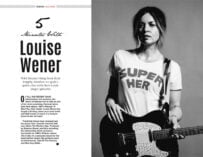
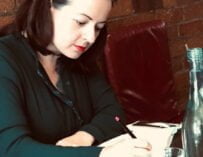
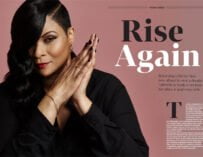


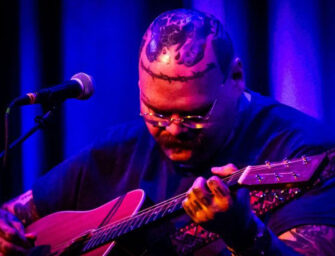
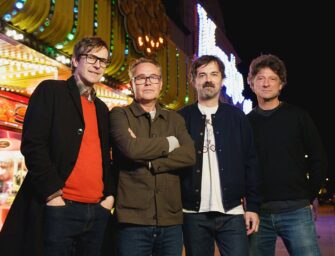

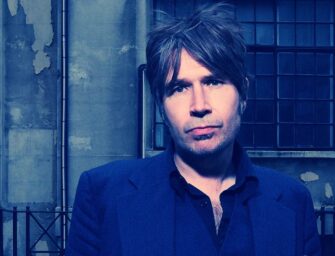























Related Articles